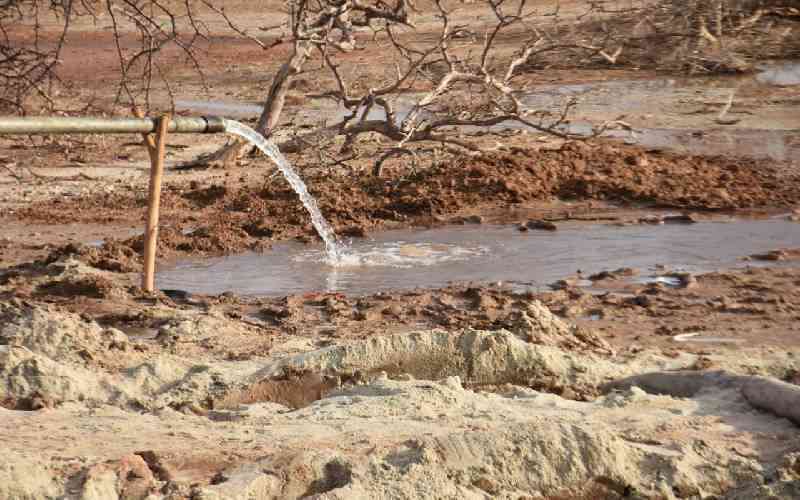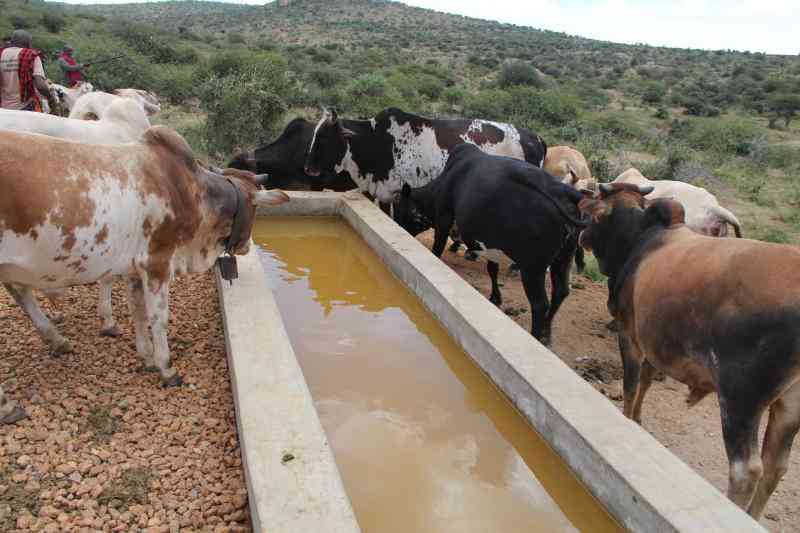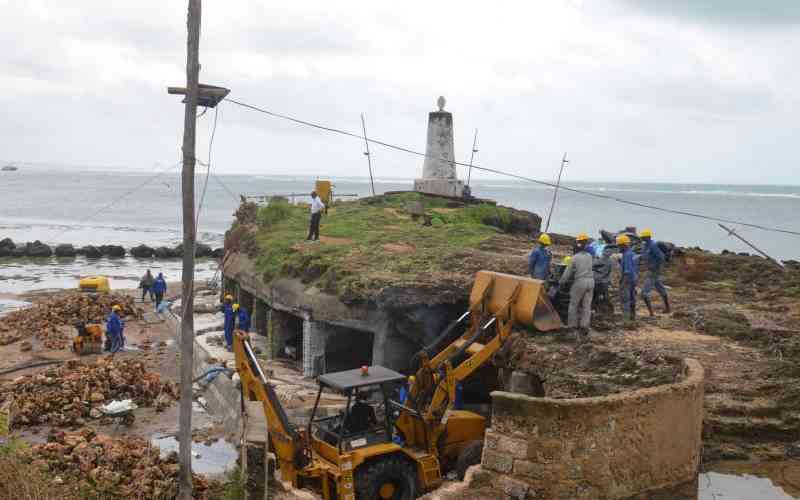The dry taps in Nairobi households have a lot to do with greedy cartels in the water distribution chain who control supply and sell the commodity at a premium to city residents, writes Allan Olingo
Dealers and officials at the City’s water distribution company, Nairobi City Water and Sewerage Company (NCWSC), are being accused of creating an artificial water shortage with the intention of benefiting from the precious commodity.
The officials, said to be working in cahoots with some Local Government leaders have created a hard to crack and penetrate syndicate, subjecting Nairobi residents to an artificial water crisis for their benefit.
While water cartels are making staggering profits from peddling water at exorbitant prices, residents in city estates are not only struggling looking for it but are forced to dig deeper into their pockets to find water for their daily needs.
They have resorted to buying the precious commodity from water vendors owned by powerful individuals operating these cartels with links to City Hall and NCWSC.
A resident of Nairobi’s Pipeline estate, Lucy Oduor, grapples with daily water problems while catering for her seven-member family. A single mother, Oduor spends a huge part of her salary to buy water. The flat she lives in does not receive regular water supply. "I have to contend with this challenge but I am planning on moving to a flat with regular supply of water as buying water from the vendors is really denting my budget," she said.
Exorbitant prices
In most city estates, a 20-litre jerry can of water costs between Sh25 and Sh50. "It has become a daily struggle to keep clean and get enough water to cater for the family needs," says Grace Katuku as she does her washing outside her house in Nairobi’s Jericho estate. She relies on the NCWSC and water vendors for her water supply.
A city councillor representing a ward in Eastlands, who did not wish to be named, noted that the city’s perennial water shortage is an act of water cartels within the City Hall corridors. "It beats logic to always see water tankers ready to supply water to residents yet this is one of their rights as stipulated in the City Hall charter. How come the water is always available for sale yet not for distribution?" he posed.
The councillor, who is a landlord, noted that some officials working in cahoots with rogue staffers at the city’s water distribution company were engaging in a thriving water business by creating a shortage and sell the same water to city residents at a premium.
 |
Water vending is a lucrative business. [PHOTOS: EVANS HABIL/STANDARD] |
"If one tank supplies a residential flat with 10,000 litres of water at Sh6,000, then you can do the maths and see how much they make from supplying an area like Embakasi with a population of hundreds of thousands," he said.
While admitting the presence of cartels in the industry, Mr Mbaruku Vyakweli, the corporate affairs manager at the NCWSC denied that there was a creation of artificial water shortage. He said the company observes a strict water delivery process which cannot be compromised for economical gains.
"We know there are cartels in the water business and we are cracking down on them, but saying that we intentionally create the shortage is not true," said Vyakweli.
Daily water consumption by residents of Nairobi currently stands at 550,000 cubic metres against a supply capacity of 450,000 cubic metres.
Stay informed. Subscribe to our newsletter
This means a shortage of 100,000 cubic metres, which does not explain why areas like Embakasi had to do without a drop from their taps for three weeks in March.
In trying to crack down on the cartels he said, "We are working closely with the police and our security and investigations department to bring these cartels down, and we are closing in on them with speed to stop this illegal business that is hurting our image."
The perennial water shortages has triggered a number of consequences in Nairobi including the rising cost of living.
These water vendors rarely divulge their source of water with most of them tapping the same from illegal water connections within their designated points mainly in industrial area. "We sell on average 10,000 litres a day depending on the needs of the area and the zone which we operate from," noted one water-vendor who operates in the Umoja area. He said he fills his water tank at night from one of the flats owned by a city godfather then re-sells to the neighbouring residential flats.
The said flat also never lacks water raising eyebrows on how one residential house can have daily supply while another next to it never has running water.
Water fund
These cartels have established a grip in Eastlands and are running water affairs in areas such as Umoja, Buruburu, Embakasi, Imara Daima and Utawala, among others estates that experience an almost permanent shortage forcing them to depend solely on water vendors.
Vyakweli said the only hope for Nairobi residents is the rainy season, which is expected to last up to May. He says fingers are crossed hoping the rain will be in plenty to fill up the dams.
The Water Services Trust Fund, the umbrella body for water management boards, in August 2010 sought providers to extend water services to low-income areas in a Sh1.8 billion project but little has been achieved so far. The Fund had received funding from lenders led by the European Union to set-up self-sustaining water projects in low-end areas.
"We are calling for all eligible water service providers operating in the eight water services boards jurisdictions to apply for funding for improvement of water supply in the low-income urban areas or low-cost planned areas and public sanitation in either markets, bus parks or densely populated settlements," said the Trust Fund in a notice to the press last year.
Data from various water vendors shows that city residents pay more for water at an average of Sh500 per 1,000 litres compared with Sh20 per 1,000 litres recommended by the Ministry of Water and Irrigation.
With Nairobi’s population rising beyond the five million mark, the projected demand for water in the city in 2020 and 2030 stands at 1.6 million and 2.2 million cubic metres respectively.
Mr Harun Nyamboki, a developer with Moke Gardens Estate notes that the need for reliable, clean and affordable source of water supply forced him to sink a borehole instead of depending on the city’s water system.
Prohibitive costs
"Initial contacts with the water services company were both unyielding and slow. The company was less responsive to our plight yet we required adequate water supply in order to commence project implementation and when eventually a quotation was obtained, the cost was prohibitive yet reliable supply was never guaranteed," he said.
He adds that even though the borehole water project did cost him Sh3.5 million, the reliability, cost-effectiveness, and quality it brings to his tenants is a greater advantage than depending on city water services.
In January, the government secured Sh770 million to expand water infrastructure for city residents, through a project that is meant to ease the perennial water shortages for Nairobi households.
A new eleven-kilometre water supply pipe will be laid with funding from French Development Agency, from Ngethu Dam, which supplies 80 per cent of Nairobi’s water needs. The project, which is set for completion in December this year, could be the only solution that will save the city’s residents from the jaws of these powerful water cartels.
 The Standard Group Plc is a
multi-media organization with investments in media platforms spanning newspaper
print operations, television, radio broadcasting, digital and online services. The
Standard Group is recognized as a leading multi-media house in Kenya with a key
influence in matters of national and international interest.
The Standard Group Plc is a
multi-media organization with investments in media platforms spanning newspaper
print operations, television, radio broadcasting, digital and online services. The
Standard Group is recognized as a leading multi-media house in Kenya with a key
influence in matters of national and international interest.
 The Standard Group Plc is a
multi-media organization with investments in media platforms spanning newspaper
print operations, television, radio broadcasting, digital and online services. The
Standard Group is recognized as a leading multi-media house in Kenya with a key
influence in matters of national and international interest.
The Standard Group Plc is a
multi-media organization with investments in media platforms spanning newspaper
print operations, television, radio broadcasting, digital and online services. The
Standard Group is recognized as a leading multi-media house in Kenya with a key
influence in matters of national and international interest.










